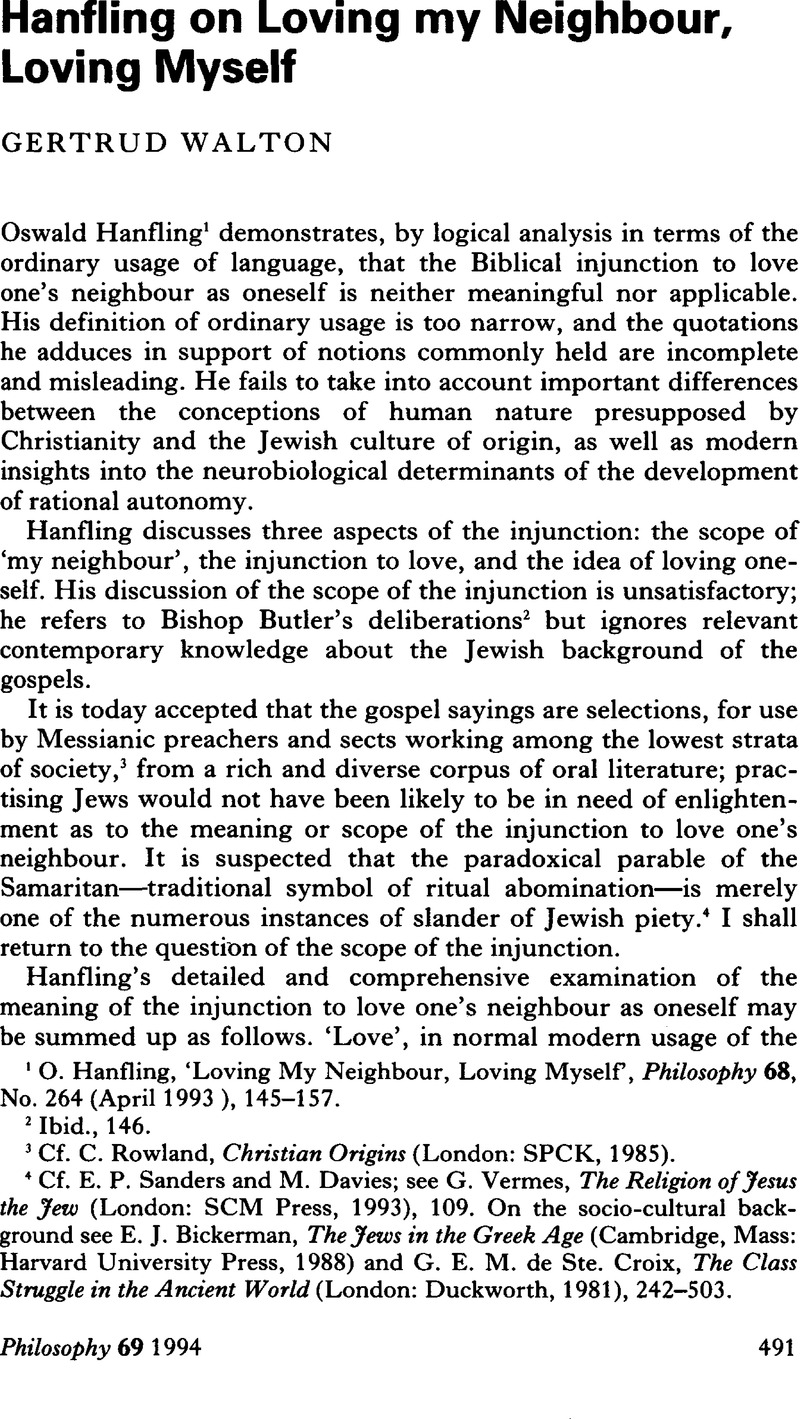Article contents
Hanfling on Loving my Neighbour, Loving Myself
Published online by Cambridge University Press: 30 January 2009
Abstract

- Type
- Discussion
- Information
- Copyright
- Copyright © The Royal Institute of Philosophy 1994
References
1 Hanfling, O. ‘Loving My Neighbour, Loving Myself, Philosophy 68, No. 264 (April 1993 ), 145–157.CrossRefGoogle Scholar
2 Ibid., 146.
3 Rowland, Cf. C., Christian Origins (London: SPCK, 198Google Scholar
4 see Sanders, Cf. E. P. and Davies, M.; Vermes, G., The Religion of Jesus the Jew (London: SCM Press, 1993), 109Google Scholar. On the socio-cultural background see Bickerman, E. J., The Jews in the Greek Age (Cambridge, Mass: Harvard University Press, 1988)Google Scholar and de Ste. Croix, G. E. M., The Class Struggle in the Ancient World (London: Duckworth, 1981), 242Google Scholar
5 Op. cit. note 1, 151Google Scholar
6 Cf., eg. A., Steinsaltz, The Essential Talmud (New York: Bantam Books, 1977), 68–172.Google Scholar
7 Op. cit. note 1, 149.Google Scholar
8 See also his discourse on forms of love in Beobachtungen iiber das Gefuhl des Schonen und Erhabenen, his distinction between the reborn and the diseased, corrupt, or undisciplined (verwilderte) soul, and between inclination (Neigung), as a sensual habit which enslaves, and the capacity for attraction (Begehrungsvermogen), an emotion generated by the liberated will in the well-ordered soul.Google Scholar
9 Metaphysische Anfangsgriinde der Tungendlehre §26Google Scholar
10 Uber, Padagogik (Darmstadt: Wissenschaftliche Buchgesellschaft, Paperback edition, 1994), Werke Vol. X, 745.Google Scholar
11 See G., Barraclough, The Origins of Modern Germany (Oxford: Basil Blackwell, 1947), 400–401.Google Scholar
12 Mortimer, R. C., The Elements of Moral Theology(London: A. & C. Black, 1947), 137 and 139.Google Scholar
13 Hanfling refers to Bishop Butler′s Fifteen Sermons but fails to take note of his discussion of human nature; he argues that human beings are able, by patient effort and practice in obedience to the injunction, to acquire the capacity to feel love spontaneously. The commentary to similar passages in The Analogy of Religion notes that Butler′s theology is here defective (London: Religious Tract Society, n.d.), 104.Google Scholar
14 Bickerman, op. cit., note 4, 29–32.Google Scholar
15 Since polities elsewhere were much troubled by the restlessness, greed, and assertiveness of their citizens, Jewish sages were believed to be in possession of secret knowledge to induce lethargy. Cf. A. Momigliano, Ancient Wisdom (Cambridge University Press, 1975), 85.Google Scholar
16 ‘Thought categories in the Hebrew Bible’, Studies in Rationalism, Judaism & Universalism, R., Loewe(ed.) (London: Routledge and Kegan Paul, 1966), 277.Google Scholar
17 For a review of essential literature, including philosophy, see Holtz, B. W., The Schocken Guide to Jewish Books (New York: Schocken, 1992)Google Scholar. For a brief account of teaching on the injunction see Jacobs, L., Jewish Values (London: Valentine Mitchell, 1960), 118–134Google Scholar
18 Bickerman, op. cit., note 4, 109Google Scholar
19 Howe, M., Learning in Infants and Young Children(London: Macmillan, 1975), 18.CrossRefGoogle Scholar
20 The Emotions (Cambridge University Press, 1986).Google Scholar
21 Changeux, J.-P., Neuronal Man: The Biology of Mind (Oxford University Press, 1985), 207–209.Google Scholar
22 Rose, S., ‘The Cellular Structure of Memory’, in his Molecules and Minds (Milton Keynes: Open University Press, 1987), 127–137.Google Scholar
23 Diamond, A., ‘Neuropsychological Insights into the Meaning of Object Concept development’, Brain Development and Cognition, Johnson, M. J. (ed.) (Oxford: Blackwell, 1993), 241.Google Scholar
24 Dodds, Cf. E. R., The Greeks and the Irrational (London: Cambridge University Press, 1966), 185. On evidence in the oldest parts of the Bible of the proudly confident Jewish assumption that passion is subject to rational control, as distinct from the experience in all other culturesGoogle Scholar, see Berger, P. L., The Social Reality of Religion (Harmondsworth: Penguin, 1973), 111–130.Google Scholar
- 1
- Cited by




